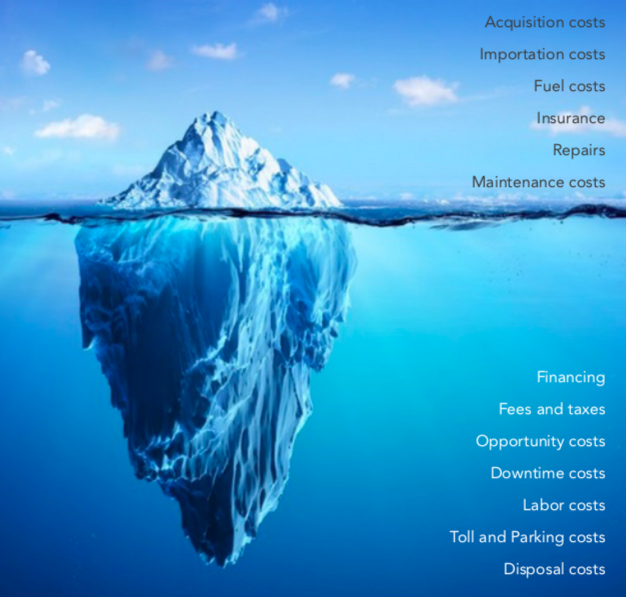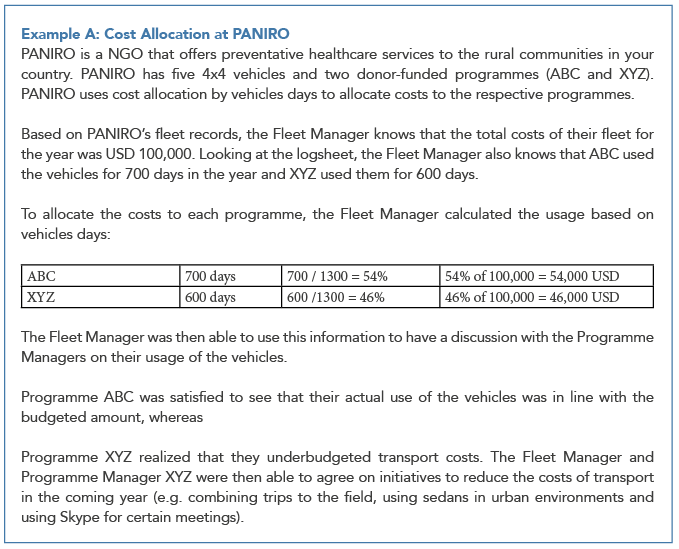- to identify what the costs of its transport services are and who should pay for it;
- to map who is using transport and accordingly, allocate costs to users (pro- grammes and supporting departments);
- to manage cost recovery from donors;
- to forecast costs for transport when creating programme budgets.
- Total cost is the group of costs that need to be allocated to programmes.
- User refers to the programmes or departments to which the costs will be allocated.
- Usage is the factor that create a cause-effect relationship between the total costs and the user.
- Days that the vehicles are used
- Kilometers that the vehicles are driven
 The PDF version of this document is found at the bottom of the page.
The PDF version of this document is found at the bottom of the page.
Allocating Fleet Costs
What is Cost Allocation?
In financial language, cost allocation is fundamentally about linking total costs to users, such as products or departments. Ideally, costs should be assigned to the user or usage that caused it. Many different terms are used to describe cost allocation in practice: allocate, assign, attribute, apportion etc.
Why is Cost Allocation Important in Fleet Management?
An effective cost allocation methodology enables an organisation:
By using cost allocation in fleet management, it allows organisations to include fleet as a direct programme cost. This ensures that the right amount of costs is budgeted and/or spent in the manner as planned and agreed. This standard method enables both donors and programme coordinators to review proposals and reports with a fleet component in a (more) structured way.
Cost allocation based on programmes / projects will increase the accountability of the agency as well as lead to more transparency and traceability of funding from donors regarding fleet cost. Moreover, donors would pay only for the actual use of the vehicle during the response instead of financing the whole vehicle. This is becoming increasingly important for organisations responding to emergencies, where the average duration of the programme is between 6-12 months.
In addition, it helps fleet managers to discuss the cost implications of operational decisions regarding vehicle usage in the projects and programmes. The more aware the Fleet Manager is of the full financial implications of providing transport to staff, the better placed they are to optimise it.
How Does Cost Allocation Work?
When speaking about cost allocation, three terms are important to understand:
Total Costs
What costs are related to fleet? Fleet Forum advises to use the Total Cost of Ownership (TCO) method when considering fleet costs. More information on TCO can be found at link.

To use cost allocation, you will need to have insight into all fleet costs of your organisation by vehicle type (sedan, 4x4, motorbike). If your organisation does not capture all the fleet costs mentioned, you can still use the cost allocation methodology. However, the risk is that your organisation will not have a grasp of the total expenditure related to fleet and will therefore be requesting too few funds.
User
This refers to the programmes or departments to which the costs will be allocated. Humanitarian organisations require transportation to implement programmes related to their organisation mandate. Therefore, the user are the staff executing donor-funded programmes as well as any staff in supporting departments that require transportation in your organisation.
Usage
Fleet costs increase or decrease depending on the usage of the vehicles. Therefore, utilization of vehicles is a cost driver in the context of fleet management. How can we quantify utilization?
Fleet Forum advises organisations to select between one of two factors:
To use cost allocation, you will need utilization information of vehicles per programme or department and per vehicle type. This information is usually captured in logbooks (per km) or from vehicle schedules (to get insight into number of days). Every programme or department should have a ‘code’ which is being captured in the logbooks or vehicle schedules.
If you do not have insight into the utilization of vehicles per programme or per vehicle, you will not be able to use this methodology to compare actual versus budgeted use, but you can still use it for budgeting. When budgeting you will need to know the amount of days or kilometres they anticipate they will need vehicles.

Cost Allocation for Future Projects or Programmes
The example of PANIRO is focused on comparing actual fleet costs versus budgeted. Fleet Managers can also play a role in accurately providing fleet cost inputs when programme proposals are being drafted. This will ensure that the organisation has sufficient funds to operate its vehicles in an effective and efficient manner.
As the Fleet Manager, if you have insight into your total fleet costs as well as the total utilization (in days or kilometers), you will be able to calculate the cost per km or per day. You can then work together with the Programme Manager to understand their transport requirements for a certain project and calculate the estimated fleet costs.
Fleet Forum has developed a Cost Allocation Tool (CAT), which can be used for the above-mentioned purposes. For more information on using CAT, contact us on: info@fleetforum.org.



Replies have been locked on this page!